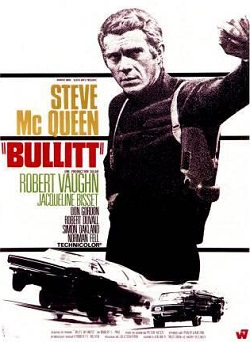Bullitt is a 1968 American dramatic thriller film starring Steve McQueen.
Bullitt may also refer to:
Woodstock was a 1969 music festival in Bethel, New York, U.S.

John Pope was a United States Senator from Kentucky. He was a member of the United States House of Representatives from Kentucky, Secretary of State of Kentucky, and the third Governor of Arkansas Territory.

Bullitt is a 1968 American action thriller film directed by Peter Yates and produced by Philip D'Antoni. The picture stars Steve McQueen as the title character, San Francisco police detective Frank Bullitt, who pursues a group of mobsters after they kill the witness he's been assigned to protect. The cast also features Robert Vaughn, Jacqueline Bisset, Don Gordon, Robert Duvall, Simon Oakland and Norman Fell. The screenplay by Alan R. Trustman and Harry Kleiner was based on the 1963 novel Mute Witness by Robert L. Fish, under the pseudonym Robert L. Pike. The film was made by McQueen's Solar Productions company, with his partner Robert Relyea as executive producer. Lalo Schifrin wrote the original jazz-inspired score.
Thomas Marshall may refer to:

Joshua Fry Speed was an American politician who was a close friend of future President Abraham Lincoln from his days in Springfield, Illinois, where Speed was a partner in a general store. Later, Speed was a farmer and a real estate investor in Kentucky, and also served one term in the Kentucky House of Representatives in 1848.

Joshua Fry Bell was a Kentucky slave owner and political figure.
Alexander Scott Bullitt was an American pioneer, planter, slaveowner, and politician from Virginia who became an early settler in Kentucky and a politician during the early days of Kentucky statehood.

Cuthbert Bullitt was an American colonial planter and lawyer from Prince William County, Virginia. During the American Revolution, he was a local and colonial politician, and voted against ratification of the U.S. Constitution at the Virginia Ratification Convention.
Thomas Bullitt was a United States military officer from Prince William County, Virginia and pioneer on its western frontier.
William Christian was a military officer, planter and politician from the western part of the Colony of Virginia. He represented Fincastle County in the House of Burgesses and as relations with Britain soured, signed the Fincastle Resolutions. He later represented western Virginia in the Virginia Senate and founded Fort William, as well as helped negotiate the Treaty of Long Island of the Holston, which made peace between the Overmountain Men and Cherokees in 1777. He was killed in 1786 at the outset of the Northwest Indian War, leading an expedition against Native Americans near what is now Jeffersonville, Indiana.

Joshua Fry Bullitt was a justice of the Kentucky Court of Appeals.

Wilton Lewis Felder was an American saxophone and bass player, and is best known as a founding member of the Jazz Crusaders, later known as The Crusaders. Felder played bass on the Jackson 5's hits "I Want You Back" and "ABC" and on Marvin Gaye's "Let's Get It On".
Gregory is an English, Scottish and Slovenian surname, variants of the name include McGregor, MacGregor, Gregor, Gregson, Gregg, Grigg, Greig and may refer to:
William or Bill Bailey may refer to:

Joshua Fry Bullitt Jr. was a Virginia lawyer who practiced in Big Stone Gap, Virginia. He was one of the leading citizens of Southwest Virginia in the late 19th and early 20th centuries, both as a practicing lawyer and as a political figure. His prominence corresponded with the rise of the coal business in central Appalachia. His legacy includes both the continuation of the energy companies that he helped to create and the careers of the prominent legal figures who worked with and learned from him, just as he was the heir to a series of accomplished legal figures. As the leader of a citizen police force, he was the model for a character in one of the best-selling novels in the United States in the first half of the 20th century.

John Christian Bullitt was a lawyer and civic figure in the city of Philadelphia, Pennsylvania. He founded the law firm known today as Drinker Biddle & Reath. Erected in 1907, Bullitt's bronze statue adjacent to City Hall was the work of artist John J. Boyle and was dedicated to his legacy of reforming Philadelphia City government.
Yancy may refer to:
Annie Henry Christian was a colonial pioneer who documented the journey with her husband William Christian and their children westward to Kentucky. Her brother was Patrick Henry, the governor of Virginia. Her sister, Elizabeth Henry Campbell Russell, was a Methodist lay leader. Her letters to family, friends, and business associates provide insight into westward movement of the 18th century America and life in the wilderness. Like Martha Washington and Catharine Flood McCall, she was a rare business woman, whose success was based upon slave labor. They had feme sole status of widows or single women who were able to operate businesses, manage finances, and enter into contracts.
William Morris Jr. was a military officer and politician in Kanawha County, Virginia. Who, prior to serving in the Virginia House of Delegates, served in the Virginia Militia from 1774 - 1792 in the Greenbrier, Ohio, and Kanawha region alongside Daniel Boone, Colonel Andrew Lewis, George Clendenin, and William Crawford rising to the rank of Major.

John Speed was an American judge and farmer in Louisville, Kentucky. He built the Farmington estate and served briefly in the American Indian Wars.